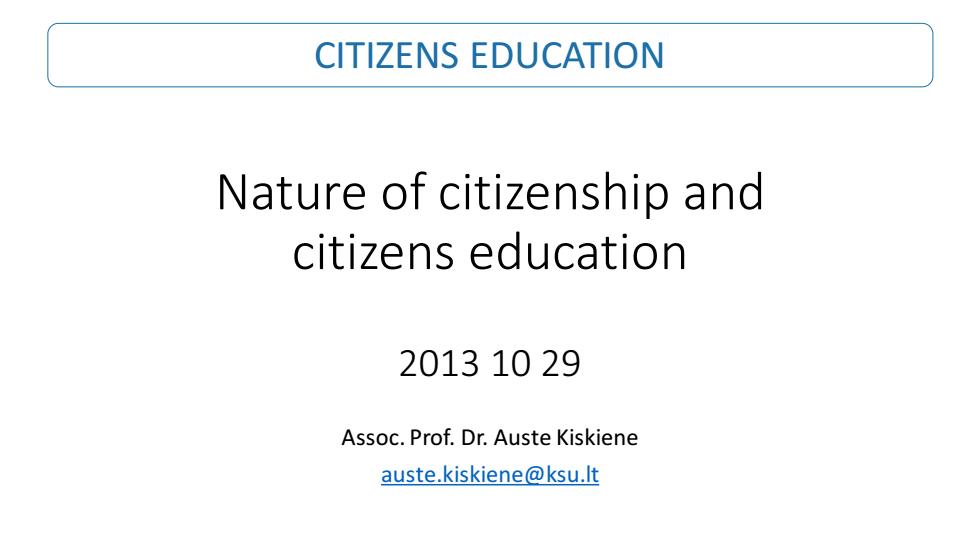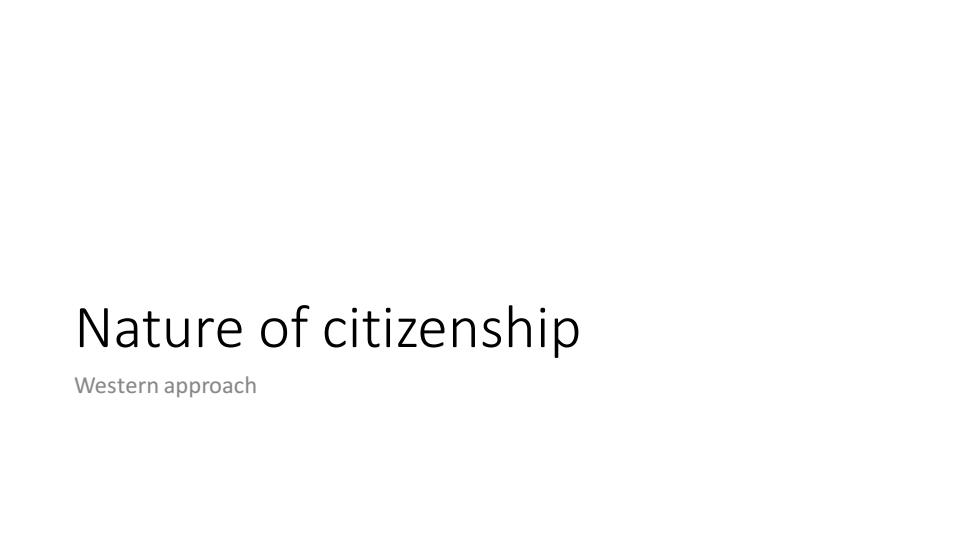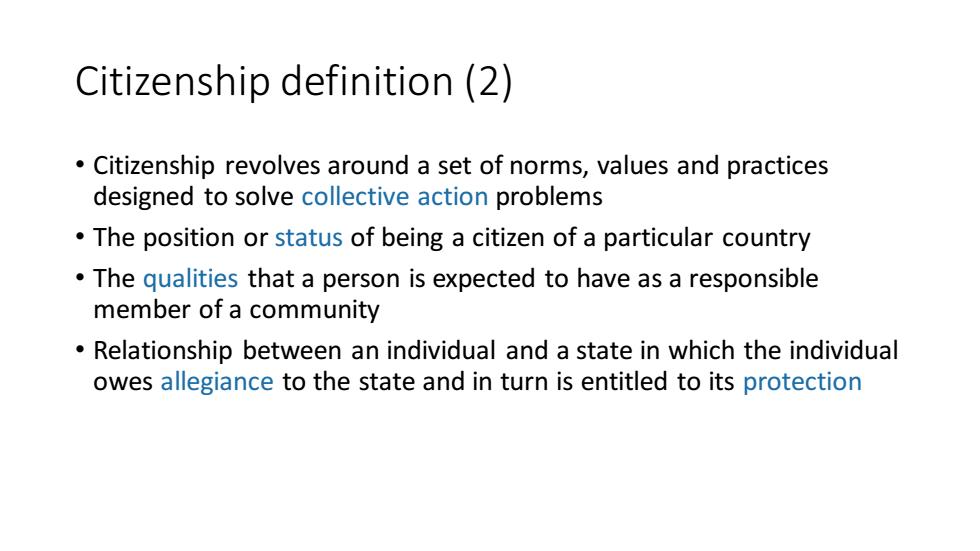
CITIZENS EDUCATION Nature of citizenship and citizens education 20131029 Assoc.Prof.Dr.Auste Kiskiene auste.kiskiene@ksu.It
Nature of citizenship and citizens education 2013 10 29 Assoc. Prof. Dr. Auste Kiskiene auste.kiskiene@ksu.lt CITIZENS EDUCATION


围通眼 面

Outline(1) Nature of citizenship Western understanding of citizenship Citizenship as a practice Main principles of citizenship Citizens'civic obligations/responsibilities Understanding of the common good:public good,social good Understanding of the civic virtue Understanding the deliberative aspect
Outline (1) • Nature of citizenship • Western understanding of citizenship • Citizenship as a practice • Main principles of citizenship • Citizens' civic obligations /responsibilities • Understanding of the common good: public good, social good • Understanding of the civic virtue • Understanding the deliberative aspect

Outline(2) Reasons for citizens education Decline of political awareness of young people Social and moral deviancy Complex and heterogeneous Western societies Complex political and social world Definition of citizens education Passive learning /active learning ·Classroom learning◆community learning
Outline (2) • Reasons for citizens education • Decline of political awareness of young people • Social and moral deviancy • Complex and heterogeneous Western societies • Complex political and social world • Definition of citizens education • Passive learning / active learning • Classroom learning community learning

Nature of citizenship Western approach
Nature of citizenship Western approach

How would you define a citizen?
How would you define a citizen?

Citizenship definition(1) Citizenship is the link between a person and a state or an association of states membership in a political body Citizenship -Nationality (more ethnic connotations) Possession of citizenship is normally associated with the right to work and live in a country and to be active in political lifeelement of exclusion Citizenship is seen by most scholars as culture-specific -the meaning of the term varies considerably from culture to culture,and over time When there are many different groups within a nation,citizenship may be the only real bond which unites everybody
Citizenship definition (1) • Citizenship is the link between a person and a state or an association of states membership in a political body • Citizenship – Nationality (more ethnic connotations) • Possession of citizenship is normally associated with the right to work and live in a country and to be active in political life element of exclusion • Citizenship is seen by most scholars as culture-specific – the meaning of the term varies considerably from culture to culture, and over time When there are many different groups within a nation, citizenship may be the only real bond which unites everybody

Citizenship definition(2) Citizenship revolves around a set of norms,values and practices designed to solve collective action problems The position or status of being a citizen of a particular country The qualities that a person is expected to have as a responsible member of a community Relationship between an individual and a state in which the individual owes allegiance to the state and in turn is entitled to its protection
Citizenship definition (2) • Citizenship revolves around a set of norms, values and practices designed to solve collective action problems • The position or status of being a citizen of a particular country • The qualities that a person is expected to have as a responsible member of a community • Relationship between an individual and a state in which the individual owes allegiance to the state and in turn is entitled to its protection

History of the citizenship concept Different approaches on the origin of the concept: Early states of Ancient Greece Modern phenomenon (few hundred years) Concept of citizenship arose with the first laws Citizenship has varied considerably throughout history: Ancient Greece Roman Empire Middle Ages Renaissance Modern Times City states Expanded Cities and towns Citizens of a city More passive concept Subject to the Citizens vs.slaves Subjects of a king form Judicial safeguard, or queen other city's law Action is No distinction rule and law ruler Nation b/w publicand delegated Obligations to private life Rights to have Concept Bond b/w person possessions disappeared and state authorities
History of the citizenship concept Different approaches on the origin of the concept: • Early states of Ancient Greece • Modern phenomenon (few hundred years) • Concept of citizenship arose with the first laws Citizenship has varied considerably throughout history: Ancient Greece Roman Empire Middle Ages Renaissance Modern Times City states Citizens vs. slaves No distinction b/w public and private life Expanded concept Judicial safeguard, rule and law Rights to have possessions Cities and towns Subjects of a king or queen / other ruler Concept disappeared Citizens of a city Subject to the city's law Nation Bond b/w person and state More passive form Action is delegated Obligations to authorities